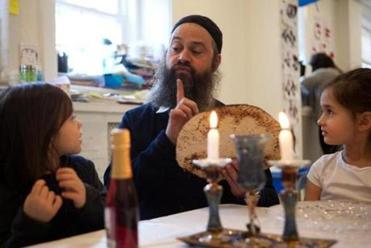By C.
It’s that time of the year again.
It’s nearly midnight, the table is laden with silver, the family is gathered around expectantly, and everyone is hungry.
My father, resplendent in his kittel and shtreimel, claps his hands and intones “Kan haben shoiel”, as he calls upon my youngest brother to begin the mah nishtaneh.
As my brother begins his well rehearsed rendition of the four questions, my father’s first phrase reverberates through my head. Kan haben shoiel, here the child asks. The implication couldn’t be any clearer. Questions are for children not adults. Adults are meant to have faith. To believe without any sort of questioning. Kan, haben shoiel.
My little brother, sitting to my left, lies sprawled out on two chairs. Apparently merely leaning to the left does not quite suffice for him. He chimes in, reciting a dvar torah about how tonight as God’s children, we’re all allowed to ask. We can ask for anything, he explains. He’s going to ask for a better understanding of whichever sugya he’s involved in, and for good chavrusas no doubt.
However, I too have questions. Questions that cannot be asked out loud at this seder.
Why do I have to choose between drinking four cups of wine, or the guilt of having caused my father anguish? Is it his fault that I’m on a rigorous diet?
Why was my father raised in a manner which forces him to believe that if I grow up to be irreligious he has failed as a parent? Is my striving to be a good person not enough?
If tonight is “leil shemurin” or a safe night, why do I feel unsafe by being who I am at this Seder? Why can’t I be my true self, just as my younger brother can?
Is there truly a God who will cut me off from my people because I don’t celebrate an undocumented event in the way an ancient book prescribes?
My questions run on and on inside of my head, until they’re cut short by my father turning to me. “Es iz tzeit tzi fraigen di kashes” he says, seemingly inviting me to ask what’s on my mind. But I don’t. Instead I recite the words I was taught to recite. Instead of asking about what’s truly bothering me, I ask the wrong questions. I say “Mah nishtana halaila hazeh m’kol haleilos”, but I’m unable to silence the real questions, playing inside of my head.


Leave a Reply